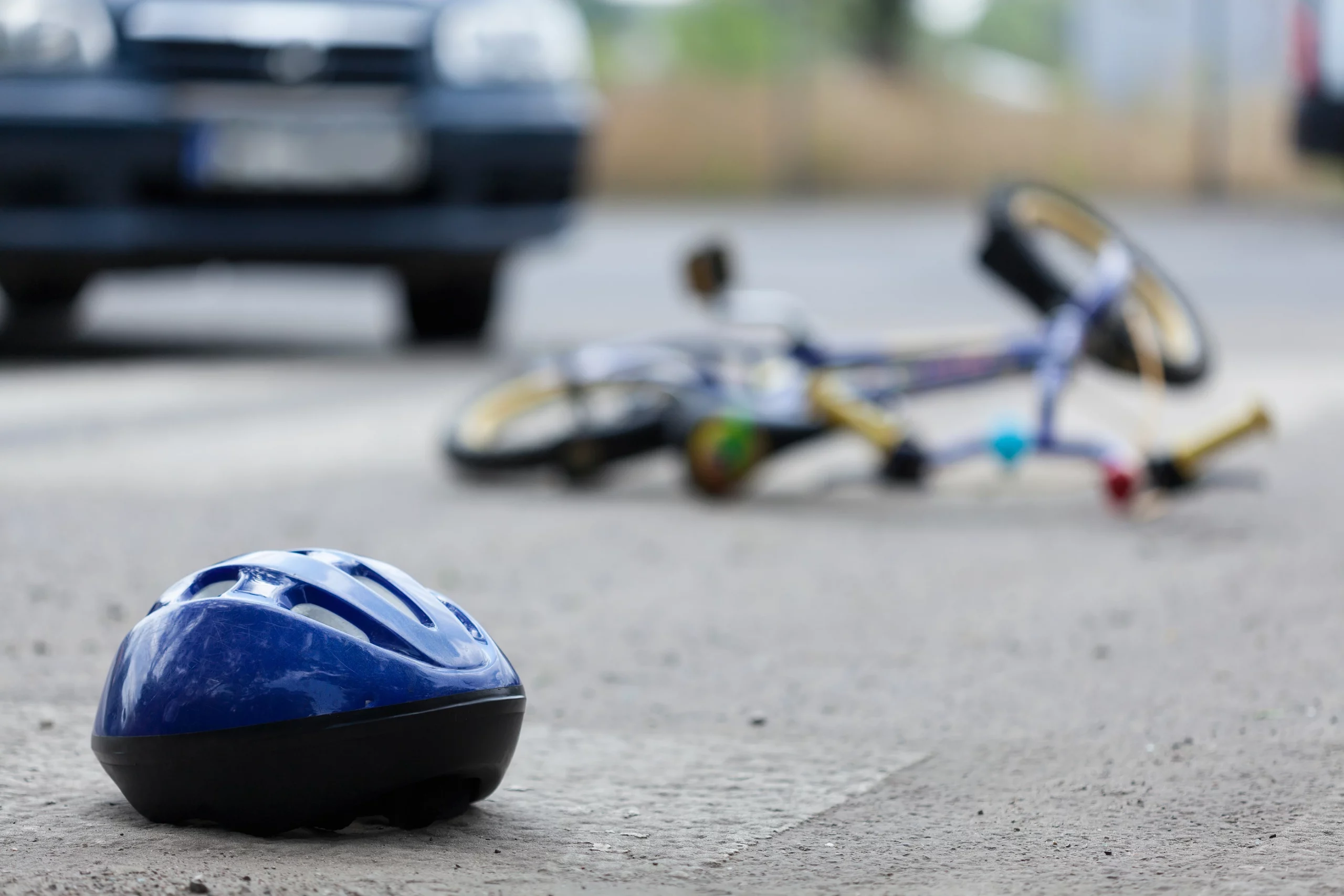Bicycling is the leading cause of traumatic brain injuries, outpacing basketball, football, hockey, and soccer. While wearing a helmet helps prevent penetrating head trauma and skull fractures, can it protect against other types of head injuries? Studies have shown that it may potentially enhance the chance of some ailments, such as concussions.
Concussions are seldom produced by high-impact collisions that shatter skulls. Indeed, concussions may develop due to a low-impact hit to the head, which may also result in blood clots (hematoma) or brain rotation.
Severe rotation may cause damage to the brain’s axons, which is the major cause of mortality from bicycle-related traumatic brain injury. Numerous minor concussions also go unreported and addressed when they should. A further injury, which may be disabling or even deadly, may occur.
As a football player returns to the game after his “bell is rung,” a cyclist may be back on his bike barely a day after colliding with the pavement. In both cases, the chance of subsequent severe traumatic brain damage is significantly elevated.
Helmet use is not the most critical part of bicycle safety. Cycling helmets have been proven to increase the likelihood of being hit by a vehicle since drivers prefer to pass a helmeted rider more closely than an unprotected rider, which is more vulnerable.
 Due to a false feeling of security, a helmeted biker may also disregard other safety precautions, such as knowing how to avoid collisions. Additionally, some cyclists complain that the wind noise sent by the helmet impairs their ability to hear approaching cars from behind.
Due to a false feeling of security, a helmeted biker may also disregard other safety precautions, such as knowing how to avoid collisions. Additionally, some cyclists complain that the wind noise sent by the helmet impairs their ability to hear approaching cars from behind.
While collisions between vehicles and bikers are the most common cause of bicycle traumatic brain injury, other types of injuries frequently occur. Objects in the road or roads that are not well maintained are common causes.
Additionally, improperly designed or produced bicycle components may be to fault. This was shown in a recent recall by Trek, a major bicycle manufacturer, in response to numerous catastrophic collisions, one of which resulted in the rider’s paralysis.
Traumatic Brain Injuries present with various symptoms ranging from minor to severe, depending on the force, direction, location, and extent of the afflicted region.
TBI symptoms include the following:
- Mild to severe headaches
- Nausea and vomiting
- Dizziness
- Loss of coordination
- Disrupted sleep patterns
- Depression and mood swings
Severe TBI symptoms include the following:
- Difficulties with attention or thinking
- Blurred vision
- Severe headache
- Partial to total memory loss
- Seizures
- Unconsciousness or coma.
Numerous brain injuries are asymptomatic but are detectable with testing. However minor, if you or someone you know has had a head injury, it is critical to seek medical assistance immediately.
If you suspect another person’s carelessness caused your damage, you should seek the counsel of an expert brain injury attorney. You may be entitled to compensation for your pain and suffering, impaired quality of life, long-term medical expenditures, rehabilitation, and lost wages.
A blow to the head does not always cause tBIs. When a motor vehicle collides with a bicycle, the cyclist may be propelled off the bike into the roadway. He or she may even crash with another car or an immobile item.
Although most TBIs result from a blow to the head, the head does not have to make contact with anything to sustain such an injury. When a motor vehicle collides with the rider or their bike, the rider’s brain may collide with the hard inside of the skull, causing brain injury.
While the helmet may function after the rider reaches the pavement, major brain damage might have happened two or three seconds sooner.
Head Trauma is a Frequently Occurring Complication of Bicycle Crashes
When a motor vehicle carrying several thousand pounds collides with a bike, the rider almost always has little chance of escaping stress and injury. Often, the force of a collision knocks a rider off their bike, causing them to fall on the road, the pavement, or other adjacent or moving objects.
Because bicycles lack airbags, crumple zones, and restraints, bikers’ bodies are nearly wholly susceptible to the physical impact of an accident. It is not uncommon for bikers to have numerous injuries in an accident, including traumatic brain damage.
When you fall off your bike — or are flung off — you often have little chance to catch yourself or manage your landing. It is natural to collide with your head, so head injuries are so prevalent in this sort of incident.
Helmets and Head Trauma
The evidence is overwhelming: wearing a helmet dramatically reduces your chance of suffering a serious head injury in a bicycle accident. Having stated that, even while wearing a helmet, it is possible to sustain serious injuries. Victims should never think their injuries will resolve on their own merely because they were wearing a helmet at the time of the event.
Notably, significant head damage after a bicycle collision may be a clue that the helmet you were wearing was flawed in design or manufacture.
Consequently, if you or someone you know suffers a brain injury while wearing a helmet, it is always prudent to keep the helmet and have the facts of your case reviewed by an attorney. In rare cases, you may be able to submit a claim against the helmet’s manufacturer.
Typical Head Injuries
When you strike your head, a variety of different injuries may occur, all of which have the potential to be catastrophic.
Several frequent head injuries sustained by cyclists include the following:
Traumatic brain injury
TBI is any brain damage induced by trauma (usually from blunt trauma, a severe shake, or penetration). A TBI may result in cognitive, physical, and/or behavioral deficits depending on which area of the brain is affected.
TBIs vary in severity, with some patients recovering completely within a year or less, while others experience lasting impairments and repercussions that affect several parts of their lives.
Concussions
Concussions are a kind of traumatic brain injury that medical practitioners often classify as “mild” TBIs. As several concussion sufferers, physicians, and scientists can confirm, this form of brain damage may be rather severe.
Its effects on a person’s life might be anything but “mild.” Symptoms of concussion might persist for weeks or months. Certain individuals develop a condition known as post-concussion syndrome, which greatly prolongs their challenges and suffering.
Skull fracture
While the skull is one of the strongest bones in the human body, it may fracture under the correct circumstances. Skull fractures may result in depressions or cracks in the skull, and portions of your skull may chip off or even move inside.
Shifting skull fractures may penetrate or compress the brain tissue, causing it to rupture or bleed and resulting in a TBI. Certain individuals with skull fractures need surgery.
Hematoma
Up to 40% of persons who suffer head trauma develop intracranial hematomas or pools and clots of blood on or within the brain. This may result in a rise in intracranial pressure, which can be fatal. Hematomas may present with various symptoms similar to those associated with other TBIs, and recovery times vary according to the patient.
Maxillofacial Trauma
Head trauma may potentially result in facial fractures (such as your cheekbones, eye sockets, nose, forehead, or jaw).
Head Injuries Treatment
Jeremy D. Earle, JD, Attorney for Bicycle Accidents.
The sort of therapy required for a head injury is determined by the type of damage received. For instance, face lacerations may need stitches, but a traumatic brain injury may necessitate immediate surgery. Our heads are the information processing centers of our bodies, including the majority of our key sense organs and the brain.
Consequently, every brain injury has the potential to be severe and needs both emergency and long-term medical care. Unsurprisingly, the medical expenditures associated with a brain injury may be substantial. It is very unusual for the wounded person’s bills to exceed the tens or even hundreds of thousands of dollars in situations requiring brain surgery.
In situations of concussions, which are usually significant, your treatment strategy may consist only of pain drugs and weeks or months of cognitive rest, which may result in weeks or months of lost work. As a result, even minor head injuries that may not need extensive hands-on medical attention might result in severe loss.
Damages
The severity of a TBI affects whether a person will need lifelong medical and personal care. These injuries may have a catastrophic financial and emotional impact on sufferers and their families. They may potentially result in premature death. Damages may include the following:
- Past medical costs and future medical bills reasonably anticipated;
- Lost wages and earnings reasonably anticipated to be lost in the future; • Any lasting deformity or impairment; and
- Pain and suffering.
- The inability to live a normal life
- The expense of funeral and burial in the case of a wrongful death
The right to ride a bike safely.
Bear in mind that California law unequivocally indicates that bikes enjoy the same traffic rights as vehicles. Certain motorists disregard such rights, while others fail to see the bicycle or fail to notice it until it is too late. In some bicycle accidents, poor road conditions are to blame. Potholes, sinkholes, repair materials, and gravel have all contributed to or caused bike accidents.
Questions That Are Frequently Asked
What if I get lasting brain damage as a result of an automobile accident?
If you have sustained an irreversible brain injury due to someone else’s carelessness, you are entitled to all medical treatments, physical and cognitive rehabilitation, and loss of quality of life. These are only a few examples, and the at-fault driver’s insurance carrier will be responsible for any reasonable damages incurred due to the injury.
What would happen if I had brain damage while without wearing my helmet?
Anyone under the age of 18 who rides a bicycle on California streets must wear a helmet. However, violating criminal law does not always imply negligence in a civil proceeding. The law considers who was at fault, and if the motorist was careless, he or she would be liable for your injuries regardless of whether you were wearing a helmet.
Is there a time restriction on resolving a personal injury lawsuit, including brain damage?
There is no time restriction on resolving a personal injury lawsuit; however, if the case is not resolved within two years of the date of injury, the victim must submit their claim before the expiration of the two years. If they do not, their entitlement to compensation may be gone.
Recovering from Bicycle Accident Losses
Fortunately, in many situations, victims of bicycle accidents who have brain injuries may seek compensation for their losses by submitting a bicycle accident claim. As with other kinds of accidents, persons wounded in bicycle incidents may seek compensation under state law.
Numerous parties may be held liable for a major bicycle accident, including:
- Motorists;
- Bicyclists;
- Equipment makers; and
- Owners of dangerous private or public property, through a premises liability action.
The most efficient approach to establishing a claim and who you may sue is to have your case reviewed by a bicycle accident lawyer near you. For further information on bicycle accidents in general, see our blog titled “Bicycle Accident Statistics.”
Warrior Injury Law has achieved several substantial financial settlements for parties involved in bicycle accidents. These prizes were given for severe brain injuries, spinal cord injuries, and neck fractures. Call immediately to schedule a free consultation with a knowledgeable personal injury attorney. Do not delay since time is essential in these instances.
Does Wearing a Bicycle Helmet Prevent Head Injuries?
For many bikers, both adults and children, wearing a helmet contributes to their safety while riding. Helmet wearing significantly reduces the chance of suffering a concussion in the case of an accident, which may range from collisions with a vehicle to sudden tumbles from the bicycle.
Regrettably, depending entirely on helmet wear to guard against harm might provide motorcyclists with a false feeling of security. While wearing a helmet reduces the likelihood of suffering a brain injury, it does not remove the danger. Despite wearing a helmet, cyclists may sustain significant head injuries.
Through the Numbers
Statistics on Bicycle Accidents Resulting in Head Injuries Wearing a helmet is a well-known safety precaution, but does it work? According to statistics, wearing a helmet is quite beneficial.
For instance, wearing a helmet reduces the chance of sustaining a catastrophic head injury by half. When bikers wear a helmet, their risk of suffering a catastrophic head injury is cut in half, even if they receive a head injury in an accident.
Reduces the chance of facial fractures
Numerous riders have facial bone injuries in bicycle accidents. Fractures of the facial bones are very painful and may result in long-term deformity.
Reduces the chance of mortality as a result of head trauma
When bikers experience head injuries, those who wear helmets are less likely to die due to their injuries than those who do not.
Helps to mitigate the severity of head traumas
Wearing a helmet may significantly reduce the severity of a head injury by up to 88%. Reduced severity may result in a more rapid recovery and the chance to resume the quality of life that existed before the accident, rather than living with the permanent consequences of a single injury.
By and large, the advantages of helmet usage corroborate society’s long-held view that helmet use results in a considerable reduction in injuries. Unfortunately, wearing a helmet does not completely prevent the danger of harm; motorcyclists may get head injuries, brain traumas, and facial fractures even when wearing a helmet.
Additionally, riders should remember that wearing a helmet should not be used as an excuse to engage in risky activity when riding. Rather than that, motorcyclists should always wear helmets and engage in other important safety practices while on the road.
The Typical Consequences of a Bicycle Accident Trauma to the Head
Suffering a head injury often entails dealing with severe daily repercussions. Head injuries may vary from very minor, with temporary symptoms, to severe, with lifetime effects. Head injuries that look moderate at first may develop into more severe symptoms over time.
Cyclists who experience head injuries on the road should seek medical assistance immediately to determine the degree of their injury.
Minor Head Injury Symptoms
Following an accident, bikers may have symptoms related to mild brain injuries, including the following:
Headaches
Many bikers get headaches after a head injury in an accident. Headaches may be moderate to severe in intensity. Even mild head injuries may cause headaches; nevertheless, wounded persons should seek medical assistance immediately when a headache worsens rather than improves.
Vomiting and nausea
Nausea and vomiting are common in the immediate aftermath of a head injury. In the early aftermath of an accident, injured persons may feel disturbed or uninterested in eating. However, nausea that intensifies quickly suggests the need for prompt medical intervention.
Tiredness or sleepiness
Following a brain injury, patients should follow their physicians’ advice for sleep and rest; nonetheless, patients may need more sleep or feel more exhausted than normal for some time following the event. Additionally, injured persons may have increased fatigue due to coping with other symptoms of a brain injury.
Sleep aids in the body’s healing process and aids in the recovery of suffering
Sleep-related difficulties Certain persons who have experienced a concussion may sleep substantially more than they normally do. Others, on the other hand, may struggle to sleep at all after an accident. Numerous persons who have had head traumas suffer from sleeplessness as a result of their injuries.
Distorted vision
Numerous persons who have had a head injury have impaired vision or difficulties focusing on objects. They may have difficulty with objects that are both near and far away.
Ear ringing
While ringing in the ears is irritating, it does not cause damage to patients. It often diminishes as a result of a head injury healing.
Dizziness
In addition to nausea, many cyclists who sustain head injuries feel dizziness or lack of balance. They may have difficulty walking regularly across a room or need more time to relax once on their feet. Cycling may be difficult or impossible until all symptoms associated with a head injury disappear entirely.
Emotional ups and downs
Cycling enthusiasts may experience mood fluctuations after a head injury. They may experience depression or heightened anxiety. Anxiety may be generic or localized to events surrounding the accident. Cyclists may also have intense emotional responses or difficulty regulating their emotions after a head injury.
Inability to concentrate
Even those who ordinarily have no difficulty focusing may find it difficult to concentrate on a single subject after a traumatic brain injury. They may struggle to maintain attention for extended periods or to induce a state of focus that allows them to concentrate on critical activities.
Issues with memory
Memory impairments may be modest after a brain injury, such as recalling basic activities or recalling names. Memory issues might also make it difficult for sufferers to execute ordinary jobs or to recall their daily routines.
Minor brain injuries may present with symptoms for a few days, a few weeks, or many months after an event. Recovery is contingent upon the severity of the injury and the victim’s capacity to bounce back and heal.
Brain Injury Suffering from Severe Trauma
While wearing a helmet reduces the likelihood of suffering a serious traumatic brain injury, it does not eliminate it. Victims of serious brain injuries may struggle to manage persistent symptoms that impair their quality of life significantly. Symptoms of traumatic brain damage may be life-altering in certain situations.
Consciousness loss, especially long-term consciousness loss
Individuals suffering from major brain injuries may have lengthy spells of unconsciousness after their accident.
Seizures and convulsions
Severe head traumas might leave victims with either short-term, acute convulsions or long-term seizure issues.
Severe perplexity
Mild disorientation may result from minor brain damage. On the other side, severe brain damage might result in significant perplexity. Sufferers may have difficulty doing routine chores or managing routine activities. They may be unable to recall familiar persons or events shortly after an injury.
Speech that is slurred
Sufferers with severe brain damage may struggle to generate regular speech. Slurred speech, particularly if a doctor has previously identified mild brain damage, should prompt patients to seek an additional assessment.
Unusual changes in behavior
Many people who have had severe brain injuries exhibit indicators of hostility or combativeness. They may struggle to control their emotions or become unmanageable. Additionally, they may exhibit indicators of significant behavioral problems.
Limb weakness or numbness
Occasionally, symptoms throughout the rest of the body may suggest a brain injury rather than limb damage. Sufferers may have difficulty with coordination or may lack typical arm and leg strength.
On-Road Bicycle Safety: Don’t Rely on the Helmet Alone
They were wearing safety gear when driving gives an additional layer of protection. No cyclist should ride their bicycle without the proper safety equipment, which includes a bicycle helmet. However, being safe does not require you to wear a helmet. Numerous other techniques may also help increase the safety of bicycles on the road by lowering the risk of head injury.
- Take caution while choosing your routes. Avoid congested routes or those where riding would cause a disturbance to general traffic patterns wherever feasible. If cycling on crowded roads is necessary, try to avoid the busiest periods of the day.
Obey traffic laws
As with motorized vehicles, bicyclists are responsible for adhering to traffic laws. Keep on the right side of the road; obey all traffic signs, lights, and signals; and yield to pedestrians. By adhering to the road regulations, you can ensure the safety of yourself and others around you.
Avoid taking excessive risks
Pay attention to the cars in your immediate vicinity. All drivers would pay complete attention to all other road users in an ideal world, including bicycles. Unfortunately, many drivers miss bicycles because they do not conform to the visual pattern expected by the majority of automobiles.
As a cyclist, you are responsible for watching other motorists. Be on the lookout for improper road conduct or any indication that cars may pose a hazard to you as a biker.
When a motorist does not seem to notice you or appears to be ready to make a dangerous decision, slow down or get out of the path. This option may cause your ride to slow down or interfere with your speed, but it will also help keep you safe.
Suffering from a Traumatic Brain Injury as a result of a Bicycle Accident
Whether slight or serious, head injuries may make it difficult for patients to function in daily life. Understanding how to deal with traumatic brain injury will help you manage your injuries and go on with your life.
Utilize applications and technologies
For many survivors of traumatic brain injury, basic skills such as memorizing shortlists or doing routine chores may become progressively challenging. Numerous applications and other forms of technology, on the other hand, may assist in simplifying routine duties. Making lists on a notes app or setting alarms to remind wounded folks of frequent duties might simplify them to do their typical daily tasks.
Take notes
Not only does writing things down make them easier to recall, but it also guarantees that information is readily available when a victim needs it. Additionally, writing down anything from reminders to names reduces irritation and fosters independence.
Ascertain that assistance is available
Individuals who have sustained severe brain injuries may need monitoring to prevent self- or other harm. Immediately after any brain damage, having assistance on hand may help patients manage frequent symptoms and allow for proper rest.
Adhere to medical guidance
Recovery from a traumatic brain injury takes time. Many patients grow irritated and seek to resume regular activities before their physicians prescribe them. However, victims should adhere to medical recommendations about when to return to work or school, manage routine activities, and obtain enough rest.
Memory issues may complicate even routine everyday chores, such as selecting the correct pots and pans, making a beloved meal, or getting the children ready for school.
Make use of labels
Labeling cabinets, drawers, and even closets may assist in locating vital objects and alleviate aggravation. Because traumatic brain injury might impair one’s ability to concentrate and complete routine chores, providing more time for each activity may be beneficial. It is beneficial to provide additional time for even the most routine activities, particularly soon after a traumatic brain injury. Allow plenty of time for relaxation as well.
Reducing stress
Numerous symptoms linked with a traumatic brain injury might be exacerbated by stress. Reduced stress throughout the healing phase may help alleviate the intensity of those symptoms and make many of the challenges that wounded persons face simpler to manage.
Have You Suffered a Concussion in a Bicycle Accident?
If you or a loved one had a brain injury in a bicycle accident, you might need legal assistance to address your concerns and pursue compensation for the full extent of your damage. Call or email the Warrior Injury Law now at 719-300-1100
We’ll begin with a free consultation to determine your accident’s cause, the extent of your brain damage, and your eligibility to pursue compensation.
We’ve assisted our clients in obtaining the most compensation possible for their injuries in many instances, and we’re prepared to use that extensive knowledge in your accident case.







